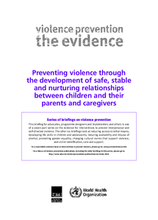This briefing for advocates, programme designers and implementers and others is one of a seven-part series on the evidence for interventions to prevent interpersonal and self-directed violence. It looks at the effectiveness of interventions that encourage safe, stable and nurturing relationships for preventing child maltreatment and aggressive behaviour in childhood. The focus is on primary prevention programmes, those that are implemented early enough to avoid the development of violent behaviour such as child maltreatment and childhood aggression (a risk factor for youth violence).
There are four types of violence prevention programmes that aim to develop these nurturing relationships. Parenting programmes (e.g. the Positive Parenting Program or Triple P) provide information and support to help parents. Parent and child programmes (e.g. Early Head Start) provide both parents and their children with family support, preschool education, child care and health and community services. Social support groups (e.g. Parents Anonymous) help parents build social networks to provide peer support and reduce social isolation. Media interventions (e.g. the television series “Families”) aim to educate all parents to increase their knowledge and strengthen awareness of child maltreatment. Evidence suggests that parenting and parent and child programmes can reduce child maltreatment and aggressive behaviour in children.
The briefing highlights that more rigorous evaluations using actual child maltreatment, rather than risk factors for child maltreatment, as an outcome measure are required, as are more cost-effectiveness studies. In addition, more research is urgently needed on the applicability and effectiveness of violence prevention programmes in developing countries.

